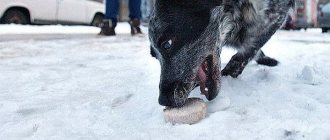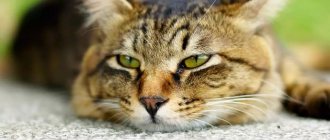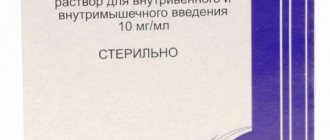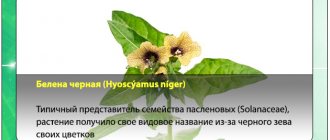Every pet that a person takes into care must be loved, cared for, pampered and looked after as best as possible if the pet suddenly gets sick or experiences a certain period of moral oppression due to a change of place of residence. There are also situations when pets may eat something that they are not supposed to eat, which can lead to food poisoning. It is not uncommon for veterinary clinics to receive animals poisoned by rat poison, and not every cat can be saved. In order to know exactly how to help an animal, you need to have an idea of the existing external signs and clinical picture of poisoning in cats.
Reasons and possible situations
Poisoning a cat with rat yawl can happen in several ways: directly - this is when the animal itself consumed the poison, and indirectly, by eating a contaminated product or an animal that died from rat poison. In turn, direct infestation most often occurs because the enviable majority of poisonous baits for rodents have a pleasant taste, which makes them very attractive both directly to pests and to pets. The second method of infection, indirect, is more common, since a rodent infected with rat poison loses its strength and speed, and, therefore, is easy prey for cats.
Many modern poisons contain sufficient amounts of toxins not only to destroy a small rodent, but also to cause irreparable harm to an organism much larger than a rat or mouse. Absolutely all products produced today for the destruction of rodents based on rat poison contain special toxic substances - rodenticides, which may contain active components such as coumarin, indandione or other toxins that have a detrimental effect on the animal. However, most poisonings occur due to the use of anticoagulant rodenticide, therefore, it is necessary to carefully consider what this substance is. An anticoagulant is a chemical that negatively affects blood clotting and prevents it from stopping during bleeding. The anticoagulant poison contains various types of coumarin, such as warfarin, brodifacoum, zoocoumarin, flomucafen, bromadiolone, coumatetralyl.
distemper in a cat - first signs and treatment
Where can a cat find poison?
If you are fighting rats and mice in your home, then special rat poison is often used. Cats can enter the room or paw the poison out of the bag without much effort and eat it. For those cats that are allowed outside the house, the poison may be waiting in basements or attics, where they are trying to remove rodents. Moreover, if an animal eats a poisoned mouse, it may suffer and even die. Therefore, when rodents are poisoned in basements or nearby houses, you should not let your pet go - rats can run a considerable distance from the place of poisoning before dying.
Also read on the topic - The dog ate rat poison - what to do
How to protect your pet?
What is the danger?
Rat poison poses an incredibly serious threat to pets because it stops blood clotting, causing the animal to die quite quickly.
It is those people who have a cat who most often encounter poisoning of the animal with rat poison, especially if they live in the private sector. This is justified by the fact that cats are very curious animals, and therefore they tend to try everything that can attract them by smell or appearance. The risk of a cat dying from rat poison especially increases if a neighbor of retirement age lives nearby who openly dislikes all animals without exception. The situation can be further aggravated by her attitude towards her vegetable garden or front garden, which, in her opinion, is spoiled by unwanted animals with their endless uninvited visits and trampling of planted flowers or vegetables. In a word, if there is such an old and harmful neighbor nearby, the cat becomes almost one hundred percent doomed to death. But in addition to unfriendly neighbors, various threats to life can await your pet, for example, the corpses of rodents poisoned by poison, which can also be eaten by curious cats.
When rat poison enters the stomach, it begins to gradually dissolve and be absorbed, which destroys the capillary walls and disrupts the production of vitamin K, which is essential for blood clotting. These disorders in the body lead to the death of the animal from heavy bleeding from all possible orifices on the body, as well as internal hemorrhage in the abdominal cavity and brain.
The cat's fur is falling out: why and what to do?
Symptoms
If the substance was poisoned from the zoocoumarin class, then the symptoms will be as follows:
- nosebleeds;
- bleeding gums;
- blood in urine and stool.
Symptoms may appear the next day or several days later. There may be vomiting. An animal can die without any signs, the cause is internal bleeding.
If the poison is from a different group, the symptoms may differ. As a rule, these may be signs of damage to the nervous system:
- convulsions;
- paralysis;
- twitching;
- coordination problems.
Your temperature may also rise. The animal will be lethargic.
What to do if your dog ate rat poison
Poisoning with zinc phosphide. This is another common anti-rodent drug. Symptoms will begin to appear within an hour. This:
- profuse vomiting (often dark brown);
- unpleasant odor from the mouth, reminiscent of spoiled fish;
- convulsions;
- breathing problems.
Clinical picture
The manifestation of symptoms of poisoning does not occur immediately, especially if the rat poison included rodenticides or anticoagulants. In most cases, symptoms appear three to five days after the animal is poisoned. Usually, until the moment of manifestation, the cat can feel quite normal due to the body’s internal reserves of vitamin K. Regardless of exactly how rat poison entered the animal’s body directly, by eating an infected rodent or mouse bait, the poison will have the same effect on the body .
Rat poisoning in cats usually manifests itself as:
- lethargy;
- anemia of the mucous membranes;
- complete refusal to eat;
- severe elevated body temperature;
- profuse internal/external hemorrhage;
- neurological disorders;
- vomit mixed with blood;
- loose stools with blood;
- hematomas;
- shortness of breath;
- tachycardia;
- convulsions.
If a pet is poisoned by such serious rodenticides as zinc phosphide or strychnine, then signs of ingestion appear almost instantly in the form of lethargy, vomiting, anorexia, convulsions and hypertonicity of the paws.
Also, rat poison often contains the content of various chemical elements, the concentration and presence of which directly determines the rate of development and the level of severity of damage to the body by toxic substances. Consequently, the period for observing signs of poisoning by rat poison can also be different and varies from several days to a couple of weeks. But, if the poison turns out to be too concentrated and potent, then the owner of the animal is more likely not to count on his cat surviving.
Is a cat drinking a lot of water normal or pathological?
What symptoms indicate intoxication?
The mechanism of action of the poison affects what symptoms the cat will experience. The following symptoms of poisoning with rat poison from the category of zoocoumarins are noted:
The first sign of intoxication in an animal is nausea, as well as irregular heartbeat.
- nosebleeds;
- impurities in urine and feces;
- vomit;
- convulsions;
- heartbeat disturbance;
- loss of appetite;
- increased body temperature;
- breathing disorder.
The most dangerous thing about poisoning is that the symptoms do not appear immediately. The effect of the substance can be different, so symptoms can occur either a week or a month after the cat ate the substance. At first, the pet may behave and feel familiar.
First aid - what the owner should do
If a pet owner notices the first manifestations of symptoms of poisoning, he should immediately take the animal to a veterinarian to provide the necessary qualified medical care. When the owner has circumstances such that he cannot quickly deliver a poisoned animal to the clinic, he must provide first aid to the cat and alleviate the pet’s suffering.
The first thing to do if poisoning is suspected is to induce a gag reflex in the cat, since this will help free the body from possible remnants of rat poison, at least those that have not yet been absorbed into the blood. In order to induce vomiting, you should give the cat to drink as much as possible, or give it a three percent solution of hydrogen peroxide, usually the amount of peroxide is calculated at one teaspoon for every five kilograms of the pet’s body weight.
Preventive measures
The only method of prevention is the attentiveness of the owners to their pet. If pet owners learn that an area will be treated for rodents, they should not let their cat outside. If this cannot be avoided, you need to monitor the animal’s condition and notice any changes in the cat’s behavior. If any unusual signs appear, it is important to contact a veterinary clinic as soon as possible, where the appropriate diagnosis will be carried out and, if necessary, the required treatment will be prescribed, which will avoid serious complications for the body and prevent the animal from dying.
What to do if your cat is poisoned by rat poison?
If a cat is poisoned by rat poison, in order to facilitate the process of saving it, it would be very good to know the name of the poison - what kind of poison entered the animal’s body. The preserved packaging, which must be provided to the doctor during the examination of the animal, will be very helpful in this situation.
When an owner discovers that his pet has been poisoned by rat poison, he needs to do the following:
- First of all, you should induce vomiting in the animal to cleanse the stomach of any remaining toxic substance. Vomiting will reduce the likelihood that the poison will be fully absorbed and spread throughout the body. There are several ways to induce vomiting: syrup from the vomiting root in a dosage of four millimeters for a medium-sized cat or three percent hydrogen peroxide. You can also sometimes give your pet plenty of boiled water and press your finger on the root of his tongue to induce vomiting. However, the latter method will be effective only if it is performed immediately after the animal ingests rat poison. Inducing vomiting after three hours from the moment the toxin enters the body is simply pointless, since during this period the rat poison has already managed to be completely absorbed into the animal’s blood.
- In addition to clearing the stomach of any remaining poison, you should definitely give the animal some kind of absorbent drug, regardless of whether the pet vomited or not. Typically, activated carbon is used as an absorbent drug; it is also possible to use other drugs for intoxication.
- After cleaning the body with the help of absorbent drugs, it is necessary to give the animal an antidote so that the blood clotting process is restored in the body, and an injectable administration of vitamin K is also necessary.
dark urine in a cat - causes and treatment
Types of rat poison
Rat poisons are divided into several categories, and knowing what symptoms a particular drug causes, you can quickly cure your pet.
- Morphine, ethylphenacin, isopropylphenacin, triphenacin. They disrupt the structure of vitamin K and prevent blood from clotting. Easily removed from the animal's body.
- Brodifacoum, flocumafen, bromadiolone. A similar principle of action, only they take longer to remove and are more destructive to the body.
- Zinc phosphide. When it enters the stomach, it destroys its walls and destroys the neurological system.
- Krysid. Causes convulsions, disrupts the functioning of blood vessels and provokes pulmonary edema.
The first two groups of drugs are common and sold in the public domain. The last two drugs have high toxicity and are controlled by a special service; they are not commercially available.
Diagnosis and treatment
Poisoning with rat poison is diagnosed using the story of the animal owner and obvious external signs of poisoning, and confirmation of the effects of toxins will be a clinical blood test, which will determine the content of the anticoagulant in the blood, a urine test and the animal’s response to the course of treatment.
When the first emergency measures have been provided and the animal’s condition has stabilized, the veterinarian prescribes maintenance therapy, which lasts from two to three weeks. Rehabilitation therapy involves giving animals vitamin K1 in tablet form. The basis for stopping the course of therapeutic therapy is a trial withdrawal of the drug for a while and a control blood sample for clotting tests. How quickly the recovery process can take place and whether recovery is possible at all will directly depend on what type of rat poison and approximately in what quantity entered the animal’s body. It is also of great importance how quickly the poisoning was diagnosed and whether the correct treatment was prescribed. If circumstances are relatively favorable, then the chance of full recovery is 83%. However, in most cases, unfortunately, the situation is somewhat different due to late contact with a veterinarian or lack of an antidote. Deaths from rat poison are quite common.
Other types of poisonous agents
It should be remembered that there are currently other types of rodent control agents on the market, not all of which are based on substances that prevent blood clotting. In particular, drugs based on... ordinary vitamin D3 are considered a very dangerous variety. How does it work?
The fact is that with an overdose of this substance in the blood plasma, the concentration of calcium and phosphorus sharply increases. This is very dangerous for the kidneys. A cat that has eaten a poisoned rodent will quickly develop signs of kidney failure. This includes edema, uremia, etc. If the animal is not taken to a veterinary clinic as soon as possible, it will either die or remain disabled for life. The longer you wait to see a veterinarian, the worse it gets. Remember that once a clinical picture of renal failure appears, there is no longer a chance for your pet to fully recover. The consequences are so severe that they condemn the animal to a lifelong “sitting” on medications.
There is no antidote to such poisons; symptomatic therapy is required. In severe cases, only a blood or plasma transfusion can save the cat. The pet is also prescribed shock doses of diuretics, which help quickly remove excess calcium and phosphorus from the body.
The most dangerous poisons (including for the cat owner) are aluminum and zinc phosphides. The fact is that when eating drugs made on their basis, the pet’s stomach begins to produce toxic phosphine gas. The more food there is in the stomach, the faster and “brighter” the chemical reaction occurs. The affected cat should immediately rinse its stomach, but this should only be done outdoors or in a well-ventilated area, otherwise you yourself may be poisoned.
Cat care
During the first 24 hours after the toxin enters the body, the cat should be given only water. Then you can transfer her to a special diet in the form of:
- Boiled lean meat or fish (these products must first be frozen).
- Boiled chicken or veal liver (pork liver is not allowed, as it is considered too fatty).
- Boiled vegetables in small quantities - they can be re-blended with minced meat.
- Oatmeal or rice porridge in small quantities.
The owner needs to be prepared for the fact that the pet may have no appetite for a long time. Under no circumstances should you force feed your cat; it is better to seek help from a veterinarian.
what to do if a cat ate a poisoned mouse
Possible sources of danger
Pet owners often ask a logical question: how can poison get into a cat’s body? According to researchers, almost all cases of poisoning are associated with hunting poisoned mice and rats. The cat feasts on a rodent from whose body the poison has not yet been removed, receiving its dose of poison.
However, one rodent accidentally eaten by a cat cannot cause serious harm. For the poison to take effect, systematic consumption of poisoned rodents is necessary. Domestic cats are not in great danger, although animals can sometimes eat rat meat bait.
Companies involved in deratization use poisons from the group of zoocoumarins in their practice. The principle of their action is simple: once in the body, the toxin destroys vitamin K and disrupts the blood clotting process, causing bleeding. Deratizers select the dose of poison so that a dog or cat that eats a poisoned rodent or bait does not die from bleeding immediately. The owner will have enough time to react and administer an antidote.
Modern poisons for rodents
Modern groups of poisons are more aggressive and dangerous. These are zoocoumarins with zinc phosphate, bromethaline, sodium fluoroacetate - potent substances that can cause severe harm to the health of a pet.
What does a veterinarian do?
When a cat is admitted to the clinic with obvious signs of poisoning, the veterinarian begins resuscitation measures.
Ideally, the cat is given a drip with 40% glucose, and at the same time the following are administered intravenously: general stimulants, detoxification drugs, hepatoprotectors, supporting cardiac activity, antiemetic and antidiarrheal drugs. Based on the general condition of the animal, the drip is repeated every other day. It is important to raise the animal’s body temperature, which usually drops significantly below normal during poisoning.
It happens that an IV cannot be placed due to weak blood pressure in the veins and the inability to get into the vessel. In very extreme cases, solutions are administered intramuscularly.
After the animal’s life is saved, it is prescribed a strict meat diet with a gradual increase in portions (feed only boiled meat, starting with meat purees from a minimum amount). Fatty foods and anything that could potentially increase the load on the liver are strictly prohibited. The administration of vitamin and restorative drugs continues (from 5 to 7 days), as well as hepatoprotectors. Depending on the intensity of the poisoning, the duration of the course of liver medications can last for several months.
List of drugs administered for cat poisoning:
- glucose (5%, 40%), reamberin, trisol, Ringer, Ringer-locka, duphalight;
- dexamethasone;
- hepatoprotectors: Essentiale, Hepatoject, thiotriazolin;
- vitamin-strengthening complexes, detoxicants: vitamin, vitamin C, B vitamins, antitox, lauritin-C, sodium thiosulfate;
- antiemetic: cerucal (metoclopramide), serenia (maropitant), ondasetron;
- cardiac medications: camphor, caffeine, cordiamine, sulfocamphocaine;
- antispasmodics: papaverine, baralgin (with caution).
Recovery diet
A poisoned cat requires attention and affection from the owner. A special diet will help her regain her strength, thanks to which she will quickly get back on her feet. So, what kind of diet will a pet weakened by poison need:
- On the first day after providing medical assistance, it is better not to feed the animal at all. It is enough to give him only water.
- Lean meat.
- Liver and fish.
- Boiled vegetables in small portions (carrots, broccoli).
- Rice porrige.
It is important to know that at first the cat may not want to eat at all. There is nothing wrong with this; under no circumstances should the owner annoy the cat by trying to feed him, much less try to do it by force. An appetite will appear, rest assured, but only after the body has fully recovered from the damage caused by the poison.
Prevention measures
Cats love to hunt and it is foolish to try to eradicate this habit from them. Moreover, most owners get these pets only because they are able to catch mice. That is why it is almost impossible to reduce the risk of poisoning in a furry friend. Even those cats that live exclusively at home can be accidentally poisoned. This is due to the fact that during mass pest control, a rat or mouse can get almost anywhere, crawling through a ventilation hood or from a neighbor’s apartment, and then dying under the sofa or somewhere else. Attracted by the smell, the cat soon finds it and eats it, thereby poisoning itself.
Hence the conclusion - you can always be afraid of poisoning. You need to follow announcements about the treatment of residential premises from rodents and try not to let the cat out of the house during these days. If the owner notices that the cat is beginning to behave strangely and restlessly, then they should immediately show it to the veterinarian. In addition, the owner of a cat should always have activated carbon in their first aid kit, and ideally vitamin K, in ampoules or tablets.
Basic information
The most common poisons today are those whose operating principle is based on a disorder of blood clotting, causing a mouse that eats a poisoned bait to die from internal bleeding. The most commonly used bases are: Brodifacoum, Difacion, Warfarin and Bromadiolone. These are very effective anticoagulants. Please note: in most cases, rat poisons containing these substances are green in color. This is necessary for pet owners, since cats themselves do not see shades of green.
Important! If your cat has eaten mouse poison, do not let him drink it under any circumstances! If the dose was large, it will immediately develop internal bleeding, from which the animal will die.
By the way, how are cats poisoned by poisons intended to kill rats? Judging by research by veterinarians and pest control companies, more than 90% of cases occur when cats eat poisoned rodents. As you might guess, the poison does not have time to be eliminated from the body of a mouse or rat, which is why the cat that eats it also receives a loading dose of poison. Much less often, animals eat the rodent killer directly, or pick up poisoned bait accidentally or intentionally left on the street.
Your actions
Often, not only the health, but also the life of a cat poisoned by rat poison depends on how correctly the animal owner acts in a critical situation. Therefore, it is very important not to panic in such cases, but to act quickly, but at the same time thoughtfully.
First aid
It is best to contact a veterinary clinic when the first symptoms of zoocoumarin poisoning appear. But if this is not possible, then you will have to act independently. What needs to be done to help a poisoned cat?
- Induce vomiting in your pet: this will help remove poison that has entered the stomach, but has not yet had time to be absorbed. But this procedure will only be effective if the owner has seen his cat swallow poison or eat a poisoned rodent. If a lot of time has passed since the cat swallowed the poison, then vomiting will not only not help, but will also increase intoxication, as it will cause dehydration.
- Give your cat any adsorbent: even regular activated carbon will do. The medicine must be diluted with water and the purr needs to drink 100 ml of the resulting mixture.
- Rehydron or a weak salt solution will also be useful: they will help maintain the water-salt balance in the animal’s body and prevent dehydration.
- In order to prevent the poison from being absorbed into the blood, you should give the cat something that coats the gastric mucosa: for example, egg white or jelly cooked from water and starch.
Important!
You can drink any liquids only after the cat has completely stopped vomiting, otherwise they will either not stay in the body and will come out along with the vomit, or the animal will choke on them.
Three hours after eating the poison, the cat should be given any laxative: for example, magnesium solution or Vaseline oil.
If the cat swallowed the poison relatively recently - no later than a few hours ago, you can give him an enema, which will also help remove the poison from the body faster.
After this, at the first opportunity, it is necessary to deliver the animal to the clinic. This is especially important if it comes to bleeding or the appearance of blood in the urine and feces, since in this case only a blood transfusion or its substitutes can save the cat’s life and speed up recovery.
Veterinary
Once the diagnosis is made, the veterinarian will immediately prescribe and begin treatment. The first thing he will do is intravenously inject the cat with a loading dose of an antidote that improves blood clotting and is an analogue of vitamin K. This vitamin itself is usually not used in emergency cases, since it is less absorbed by the animal’s body than the same vikasol.
Then intravenous injections of medications and drip infusions of saline will be given. Also, if necessary, the doctor will perform a transfusion of blood or blood substitutes.
And finally, maintenance therapy will be carried out, after which the owner will be allowed to take the pet home.
Attention!
The first time after symptoms of intoxication appear, the antidote is administered only intravenously and, moreover, in loading doses, since most of it will still be neutralized by the poison. After the condition has normalized, and not earlier than after several days, the cat can be given Vikasol in tablets and not in such a large dose.
Care at home
On the first day after poisoning, the cat can only drink water, as well as water-salt solutions and rehydron solution. Giving the animal a decoction of medicinal herbs, such as nettle, linden or chamomile, also has a good effect.
And only from the second day it will be possible to begin to introduce dietary foods with a reduced fat content into the diet, such as:
- Lean meat and fish.
- Porridge on water - rice or oatmeal.
- Boiled zucchini and carrots.
- Kefir (no fatter than 2.5% fat) and low-fat cottage cheese.
You can also try giving your pet special medicinal food, which some companies produce for sick and weakened animals.
But before you buy it, you will need to consult a veterinarian: he will recommend the brand of food that is most suitable for a cat recovering from rat poisoning.
It happens that in the first days the animals refuse to eat. In this case, there is no need to try to feed the cat at any cost. But if the hunger strike drags on for 2-3 days, then he will need to be taken to the clinic for intravenous injections and drips, which will support the body in this case.
Important!
Treatment of a cat poisoned by rat poison should only be carried out under the supervision of a veterinarian.











